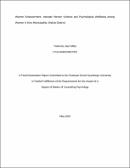| dc.description.abstract | The study aimed at examining the relationship between intimate partner violence, women empowerment and psychological wellbeing among women in Kira Municipality, Wakiso. The study was guided by the following objectives: to examine the relationship between intimate partner violence and psychological wellbeing, to assess the relationship between intimate partner violence and women empowerment , to assess the relationship between women empowerment and psychological wellbeing, to establish the mediating effect of women empowerment on intimate partner violence and psychological wellbeing and to determine the predictive potential of women empowerment and intimate partner violence on psychological wellbeing. The study followed a cross sectional survey design involving 392 women participants. Results indicated: a significant and positive relationship (r = .202, p≤ .001) between intimate partner violence and psychological wellbeing; a significant relationship (r =.309, p≤ .001) between intimate partner violence and women empowerment and a negative relationship (r = -.339, p≤ .001) between women empowerment and psychological wellbeing among the same women. Furthermore, the study established that women empowerment has a full mediation of the relationship between intimate partner violence and psychological wellbeing (Effect size= -29, Boot standard error = .07, BootLLCI= -.41, BootULCI=-.16), and women empowerment was found to be a strong predictor of Psychological Wellbeing, (= -.350, p ≤ .001); and intimate partner violence strongly predicted Psychological Wellbeing, (= -.327, p ≤ .001, with R2 =. 121). Hence, high levels of women empowerment increased intimate partner violence because empowerment is still perceived as a threat to traditional gender roles and male dominance where men fear that empowerment could cause women to deviate from their gender roles and become more self-independent, thus, undermining men’s authority. | en_US |

